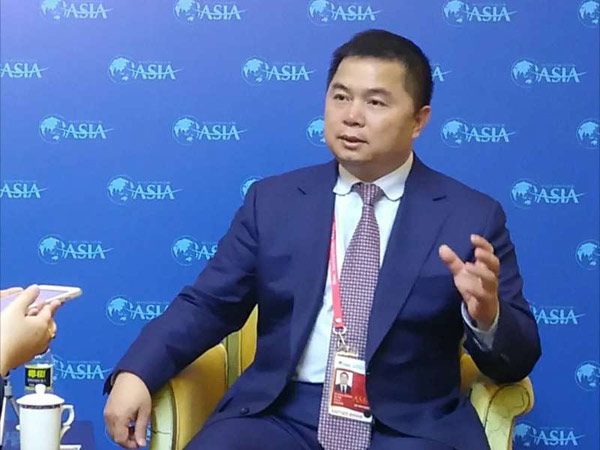
Zhang Shufeng, executive president of Shanghai-listed China Fortune Land Development (CFLD) Co Ltd, is interviewed by China Daily website during the Boao Forum for Asia (BFA) Annual Conference 2018 in South China's Hainan province, April 10, 2018. [Photo provided to chinadaily.com.cn]
The development of China's industrial parks represented by development zones and high-tech zones has become one of the hot topics at the ongoing Boao Forum for Asia (BFA) Annual Conference 2018.
Zhang Shufeng, executive president of Shanghai-listed China Fortune Land Development (CFLD) Co Ltd, the operator of "new industry city", said on Tuesday during the forum that building new industry cities that are driven by innovation and the development of industrial clusters will be the effective practice of the economic transformation and upgrading of sustainable high quality development in China's counties.
This year marks the 40th anniversary of China's reform and opening-up policy. Over the past four decades, China has completed the largest urbanization process in human history by achieving the urbanization of 640 million people. With the development of urbanization, the number and scale of cities in China have been expanding and several urban clusters have been formed.
Zhang pointed out while the gap between first-and-second-tier cities has been narrowed in the past several years, China's counties are left behind because they are short of capital, talents, technologies and industries.
According to the report of the 19th National Congress of the Communist Party of China in October last year, China will take the urban agglomerations as the main body to build an urban pattern with the coordinated development of large and medium-sized cities and small towns, and will speed up the process of granting urban residency in an orderly manner to rural people who have moved to cities.
Zhang said this new pattern of cities and towns provides a rare opportunity for the development of county economies.
He told China Daily website that to realize the transformation and upgrading of China's county economy, the core is to accelerate the transformation and upgrading from the production factor-and-investment-driven mode to the innovation-and-capital-driven mode.
In the past several years, CFLD has worked with local governments to boost the sustainable economic and social development of regions and cities by adopting the Public-Private Partnership (PPP) model in building new industry cities, Zhang said.
Entrusted by local government, CFLD can provide a comprehensive solution for a city, which includes planning, design, land consolidation, investment, infrastructure construction, public facility development, industry investment solicitation and city operation services, according to the company.
It has constructed new industry cities in many regions, such as East China's Zhejiang and Anhui provinces and Central China's Henan province. In 2015, the Gu'an New Industry City, which was developed by CFLD in partnership with the local government, was named as the regional-level PPP project by the National Development and Reform Commission.
Located in Hebei province, Gu'an used to be a traditional agriculture county. By introducing strategic partners to jointly work for the new industry city, the revenue of the city increased from 110 million yuan in 2002 to 9.85 billion yuan in 2017, Zhang said.
He said committing to the core strategy of "industry first", CFLD has established three 100-billion-yuan-level industrial clusters in Gu'an, which include new display screen, aerospace and biomedicine.
In addition, the company introduced a sixth-generation fully flexible AMOLED (active-matrix organic light emitting diode) production line project with a total investment of 26.2 billion yuan into Gu'an and the project will fully start production this year, according to Zhang.
By the end of 2017, with its business spanning across 13 provincial regions in China and six other countries, CFLD had signed contracts with more than 1,900 enterprises, amassed a projected investment capital of 500 billion yuan and created more than 82,000 job opportunities.